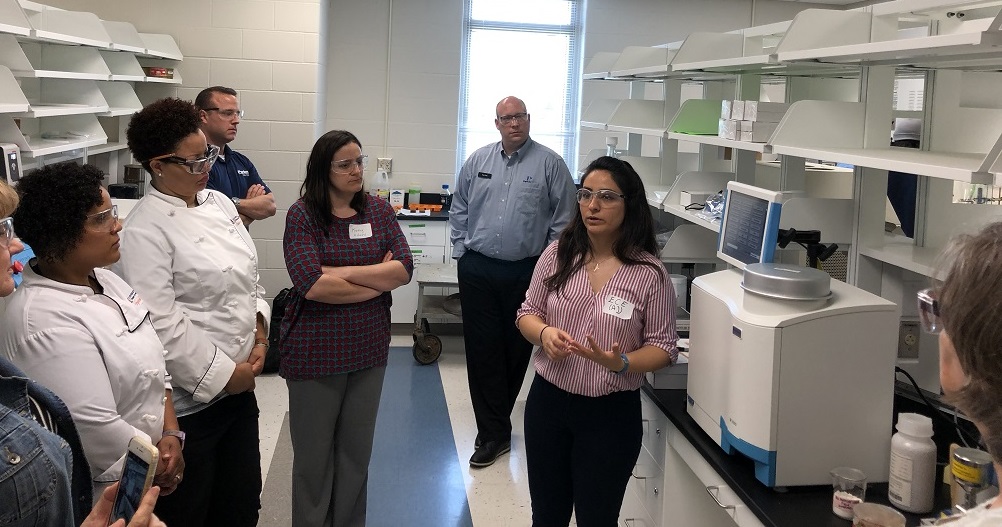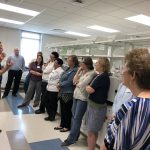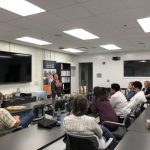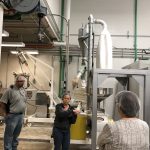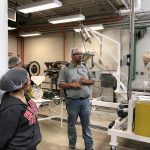URBANA, Ill. – Food system professionals working to promote local and artisanal grain use recently attended a unique tour at the Integrated Bioprocessing Research Laboratory (IBRL) and the Food Science and Human Nutrition Pilot Processing Plant (FSHN-PPP), in the University of Illinois College of Agricultural, Consumer and Environmental Sciences.
The Artisan Grain Collaborative (AGC) funded the tour. Amy Cook, executive director of The Farmer Chef Alliance and a member of the AGC, worked with Brian Jacobson, assistant director of Food and Bioprocessing Pilot Plant operations, and Beth Conerty, business development manager of IBRL, to coordinate and promote the tour.
Adam Davis, department head for crop sciences opened the day with remarks. Jessica Rutkoski, an assistant professor of small grains breeding provided an overview of genetics and environmental effects on grain quality and research programs focused on artisanal grains.
In the afternoon, Ece Gulkirpik, a FSHN doctoral candidate, and representatives from Perten Instruments gave a demonstration of grain testing equipment. Perten provides a variety of testing equipment used by the FSHN-PPP and IBRL. Participants were able to watch a demonstration of equipment such as the Inframatic 9500, which analyzes grain and flour composition, and the Doughlab, which tests for dough quality. They also learned about Falling Number, a test for an enzyme that can significantly reduce grain quality when present.
“We’re all too much in our own little worlds sometimes,” says Cook. “It’s eye-opening for a baker to see the equipment that does the testing. It helps them understand the numbers they read in the reports they get from the miller or the farmer.”
Jill Cummings, head miller for The Mill at Janie’s Farm, demonstrated the grain milling operation that included mill operations and settings, flour quality, sifting on both an 8-inch test mill, as well as a 20-inch production mill. Demonstrations on packaging included semi-automatic filling equipment, plastic pouch sealing, and bag sewing.
“Harold Wilkens, the owner of Janie’s Farm, has over 2,000 acres and has farmed organically for more than 15 years. His son Ross is an Illinois alumnus, and was my first student worker in the Pilot Plant, so we know that group well.”
Cook says, “One of our participants was an instructor from National Louis University and was very excited to take this information back to her students. She’s talked about all these things in the class room, but now she’ll have photographs to share and a more in-depth knowledge of the things she’s been teaching.”
Jacobson says both demonstrations were very well received, and an added bonus for the participants was the lunchtime roundtable discussion. Carrie Anderson, the administrative executive chef for residential dining at Illinois, and members of her staff spoke with participants about the challenges of using small grains in an institutional setting, and addressed how farmers and institutional chefs could develop stronger relationships. The Illinois catering team provided the lunch using locally sourced ingredients including some grown at the Sustainable Student Farm.
“It was very interesting for our participants to get the perspective of a group that does thirty-some thousand meals a day,” says Jacobson.
“They were able to talk with the food service director of a large institution and ask how they could get more local foods into those institutions,” Cook says. “One of the greatest benefits was having everyone in the same room sharing information.”
Jacobson adds, “This was the first time we offered a comprehensive tour of this type and I’m sure we’ll do it again. It might not be exactly the same, because the area of artisanal grains grows and changes all the time. But if an opportunity arises, we’ll take advantage of it.”
Source:
News writer: Leanne Lucas, llucas@illinois.edu
- Group learns about RVA capabilities
- Jill Cummings from the Mill at Janie’s Farm speaks to participants about milling grains
- Jill Cummings demonstrates milling
- Jedi Brown explains milling in the Food Science Human Nutrition Pilot Plant

